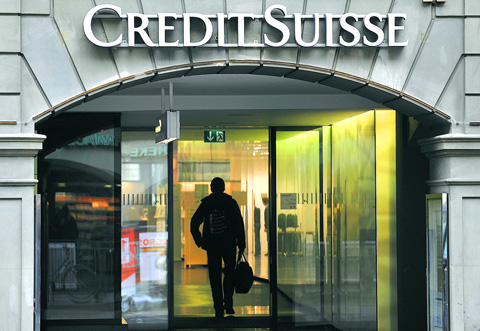Credit Suisse bank plunged into its first quarterly loss for five years yesterday, reporting heavy extra writedowns because of the subprime home-loan crisis in the US.
But the bank’s chief executive assured reporters that the situation had “stabilized” this month, and that the group was well-positioned to navigate in difficult market conditions.
The bank reported a net loss of 2.148 billion Swiss francs (US$2.11 billion) for the first three months of the year.

PHOTO: AFP
Writedowns in leveraged finance and structured products reached SF5.3 billion for the three months, the bank said.
The bank had already written down SF3.2 billion, but posted a profit for last year of SF7.76 billion.
It has so far fared better than fellow Swiss banking giant UBS, which has posted writedowns exceeding US$37 billion as well as its first-ever full-year loss last year.
UBS is the biggest Swiss bank, Credit Suisse is the second biggest.
A writedown is a reduction of the previously estimated value of an asset because prospects for its performance are acknowledged to have been seriously reduced for the foreseeable future.
However, Credit Suisse said there had been a “continued significant reduction” in its risk exposure.
“Our first-quarter results are clearly unsatisfactory,” the bank’s chief executive officer Brady Dougan said.
“However, during the quarter, we substantially reduced our exposures to affected areas and we will continue to do so in a disciplined fashion,” he said.
In a conference with journalists, Dougan said: “March was very difficult, things have stabilized in April, hopefully things will improve from here.”
Dougan said the group is “well-positioned to navigate in difficult market conditions.”
While reiterating that the bank has cut its risk exposures, Dougan said it remains “hard to predict” if further write-downs would be made.
The bank’s investment banking unit, which has been most exposed to the subprime crisis, posted losses before taxes of SF3.46 billion for the quarter.
“This decline was due in large part to the impact of the mortgage and credit market dislocations on the fixed income businesses,” the bank said.
Its asset management unit was also affected, as it posted a loss after securities that it bought from its money market funds fell in value.
Analyst and trader of Zuercher Kantonalbank Claude Zehnder pointed out that Credit Suisse still has some risk on its books and that further writedowns would depend on market conditions.
“Lower house prices could still affect some of these exposures,” Zehnder said.
“It could easily still write down another [SF] 2, 3 or 4 billion,” the analyst said.
However, he went on to say that the “general mood seems to be that the worst is over for financial stocks.”

MORE VISITORS: The Tourism Administration said that it is seeing positive prospects in its efforts to expand the tourism market in North America and Europe Taiwan has been ranked as the cheapest place in the world to travel to this year, based on a list recommended by NerdWallet. The San Francisco-based personal finance company said that Taiwan topped the list of 16 nations it chose for budget travelers because US tourists do not need visas and travelers can easily have a good meal for less than US$10. A bus ride in Taipei costs just under US$0.50, while subway rides start at US$0.60, the firm said, adding that public transportation in Taiwan is easy to navigate. The firm also called Taiwan a “food lover’s paradise,” citing inexpensive breakfast stalls

TRADE: A mandatory declaration of origin for manufactured goods bound for the US is to take effect on May 7 to block China from exploiting Taiwan’s trade channels All products manufactured in Taiwan and exported to the US must include a signed declaration of origin starting on May 7, the Bureau of Foreign Trade announced yesterday. US President Donald Trump on April 2 imposed a 32 percent tariff on imports from Taiwan, but one week later announced a 90-day pause on its implementation. However, a universal 10 percent tariff was immediately applied to most imports from around the world. On April 12, the Trump administration further exempted computers, smartphones and semiconductors from the new tariffs. In response, President William Lai’s (賴清德) administration has introduced a series of countermeasures to support affected

CROSS-STRAIT: The vast majority of Taiwanese support maintaining the ‘status quo,’ while concern is rising about Beijing’s influence operations More than eight out of 10 Taiwanese reject Beijing’s “one country, two systems” framework for cross-strait relations, according to a survey released by the Mainland Affairs Council (MAC) on Thursday. The MAC’s latest quarterly survey found that 84.4 percent of respondents opposed Beijing’s “one country, two systems” formula for handling cross-strait relations — a figure consistent with past polling. Over the past three years, opposition to the framework has remained high, ranging from a low of 83.6 percent in April 2023 to a peak of 89.6 percent in April last year. In the most recent poll, 82.5 percent also rejected China’s

PLUGGING HOLES: The amendments would bring the legislation in line with systems found in other countries such as Japan and the US, Legislator Chen Kuan-ting said Democratic Progressive Party (DPP) Legislator Chen Kuan-ting (陳冠廷) has proposed amending national security legislation amid a spate of espionage cases. Potential gaps in security vetting procedures for personnel with access to sensitive information prompted him to propose the amendments, which would introduce changes to Article 14 of the Classified National Security Information Protection Act (國家機密保護法), Chen said yesterday. The proposal, which aims to enhance interagency vetting procedures and reduce the risk of classified information leaks, would establish a comprehensive security clearance system in Taiwan, he said. The amendment would require character and loyalty checks for civil servants and intelligence personnel prior to